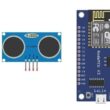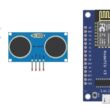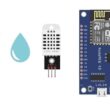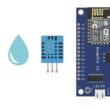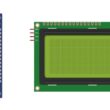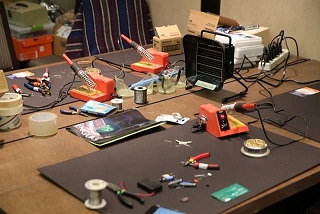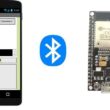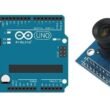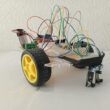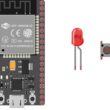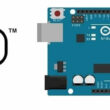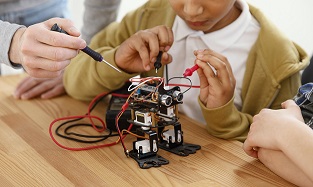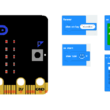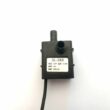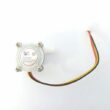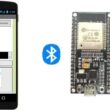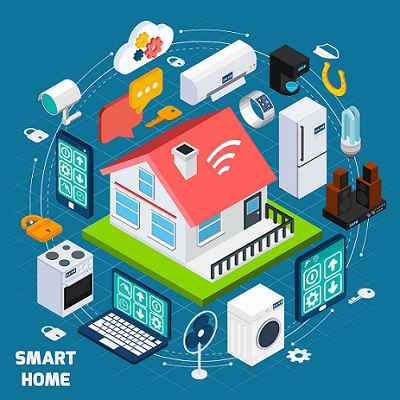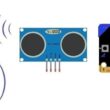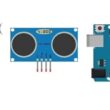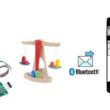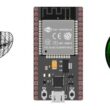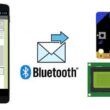Remotely light up three LEDs connected to Arduino UNO by remote control
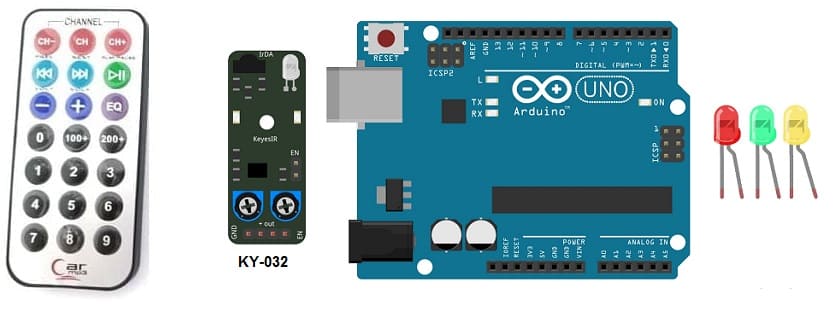
Tutorial plan
1- Introducing the KY-032 Infrared Sensor
2- The relationship between the KY-032 infrared sensor and a remote control
3- How to receive theArduino UNO an infrared signal from the remote control using the KY-032 sensor?
4- The components needed to use the KY-032 infrared sensor and three LEDs with the Arduino UNO
5- Mounting the Arduino UNO with the KY-032 infrared sensor and three LEDs
6- Arduino UNO programming of the Arduino UNO to receive data from the KY-032 infrared sensor and light up three LEDs
Introducing the KY-032 Infrared Sensor
The KY-032 Infrared Sensor is a module that is commonly used in electronics and robotics projects for detecting the presence of infrared signals. It is also known as an infrared obstacle avoidance sensor module. The module consists of an infrared emitter (LED) and an infrared receiver (phototransistor) placed side by side.
Here are some key features and characteristics of the KY-032 Infrared Sensor:
1- Detection Method: The sensor module detects infrared light by emitting a modulated infrared signal and measuring the reflection. When an object is present in front of the module, the infrared light emitted by the LED bounces off the object and is detected by the phototransistor.
2- Operating Voltage: The KY-032 module typically operates at a voltage range of 3.3V to 5V, making it compatible with most microcontrollers and development boards.
3- Digital Output: The module provides a digital output that can be easily interfaced with microcontrollers or other digital circuits. It produces a HIGH (logic 1) output when no obstacle is detected and a LOW (logic 0) output when an obstacle is detected within its detection range.
4- Adjustable Detection Range: The detection range of the KY-032 sensor can be adjusted using a potentiometer on the module. This allows you to fine-tune the sensitivity of the sensor according to your specific requirements.
5- Applications: The KY-032 Infrared Sensor can be used in various applications, including obstacle detection and avoidance in robotics, line following robots, proximity sensing, object detection, and security systems.
When using the KY-032 Infrared Sensor, it's important to keep in mind that it primarily detects the presence of objects based on their reflective properties rather than their distance. The effectiveness of the sensor can be affected by factors such as ambient light and the reflective properties of the objects being detected.
How to receive the Arduino UNO board an infrared signal from the remote control using the KY-032 sensor?
To receive an infrared signal from a remote control using the KY-032 sensor and the Arduino UNO board, you can follow these steps:
1- Connect the KY-032 sensor to the Arduino UNO board. The KY-032 sensor typically has three pins: VCC, GND, and OUT.
- Connect the VCC pin of the KY-032 sensor to the 5V pin on the Arduino UNO board.
- Connect the GND pin of the KY-032 sensor to the GND pin on the Arduino UNO board.
- Connect the OUT pin of the KY-032 sensor to a digital pin on the Arduino UNO board, such as pin 5.
2- Download and install the IRremote library in your Arduino development environment. This library will enable you to receive and decode infrared signals.
- Open the Arduino IDE on your computer.
- Go to "Sketch" -> "Include Library" -> "Manage Libraries".
- Search for "IRremote" in the search box.
- Select the "IRremote" library by shirriff.
- Click "Install" to install the library.
3- In the Arduino IDE, create a new sketch and use the following code as a starting point:
|
1 2 3 4 5 6 7 8 9 10 11 12 13 14 15 16 17 18 19 20 21 22 |
#include <IRremote.h> int RECV_PIN = 2; // Use the same pin that you connected to the OUT pin of the KY-032 sensor IRrecv irrecv(RECV_PIN); decode_results results; void setup() { Serial.begin(9600); irrecv.enableIRIn(); // Enable infrared reception } void loop() { if (irrecv.decode(&results)) { unsigned long value = results.value; Serial.println(value, HEX); // Print the received infrared code in hexadecimal format irrecv.resume(); // Prepare the sensor to receive the next infrared signal } } |
4- Upload the sketch to the Arduino UNO board.
Now, when you press a button on your infrared remote control, the corresponding infrared code will be printed in the Serial Monitor of the Arduino IDE at a baud rate of 9600.
The components needed to use the KY-032 infrared sensor and three LEDs with the Arduino UNO board
To use the KY-032 infrared sensor and LED with the Arduin UNO, you will need a few components and connections. Here's a list of the required items:
1- Arduino UNO board:
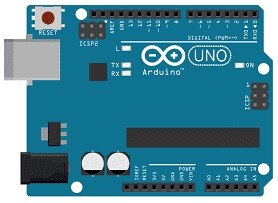
The Arduino UNO board is a popular microcontroller board based on the ATmega328P microcontroller. It is one of the most commonly used Arduino boards and provides a versatile platform for creating interactive electronic projects.
The Arduino UNO board is suitable for beginners and experienced users alike, offering a flexible and accessible platform for prototyping and building various electronic projects, from simple LED blinking to complex robotics and home automation systems.
2- KY-032 Infrared Sensor:

This sensor detects infrared signals and can be used to detect objects or receive signals from a remote control.
3- three LEDs (Light Emitting Diode):
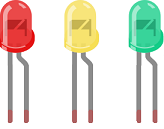
A Light Emitting Diode (LED) is a semiconductor device that emits light when an electric current passes through it. LEDs are widely used in various applications due to their efficiency, small size, and low power consumption.
4- three resistors :

Resistors are passive electronic components that impede the flow of electric current in a circuit. They are widely used in electronics and electrical engineering for various purposes, such as limiting current, voltage division, and controlling signal levels. The primary function of a resistor is to provide resistance to the flow of electric charge, which causes a drop in voltage across the component.
4- Breadboard:
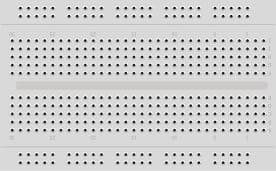
A breadboard is a useful tool for creating temporary electronic circuits. It allows you to connect components without soldering.
5- Jumper wires:
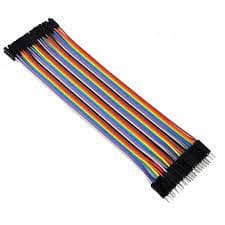
These wires are used to make connections between the Micro:bit, KY-032 sensor, LED, and breadboard.
Mounting the Arduino UNO board with the KY-032 infrared sensor and three LEDs
To mount the Arduino UNO board with the KY-032 infrared sensor and three LEDs, you can follow these steps:
1- Connect the KY-032 infrared sensor to the Arduino UNO board:
- Connect the VCC pin of the KY-032 sensor to the 5V pin on the Arduino UNO board.
- Connect the GND pin of the KY-032 sensor to the GND pin on the Arduino UNO board.
- Connect the OUT pin of the KY-032 sensor to a digital pin on the Arduino UNO board, such as pin 5.
2- Connect the red LED to the Arduino UNO board:
- Connect the anode (longer leg) of the red LED to a current-limiting resistor, such as a 220-ohm resistor.
- Connect the other end of the resistor to a digital pin on the Arduino UNO board, for example, pin 4.
- Connect the cathode (shorter leg) of the LED to the GND pin on the Arduino UNO board.
3- Connect the green LED to the Arduino UNO board:
- Connect the anode (longer leg) of the green LED to a current-limiting resistor, such as a 220-ohm resistor.
- Connect the other end of the resistor to a digital pin on the Arduino UNO board, for example, pin 3.
- Connect the cathode (shorter leg) of the LED to the GND pin on the Arduino UNO board.
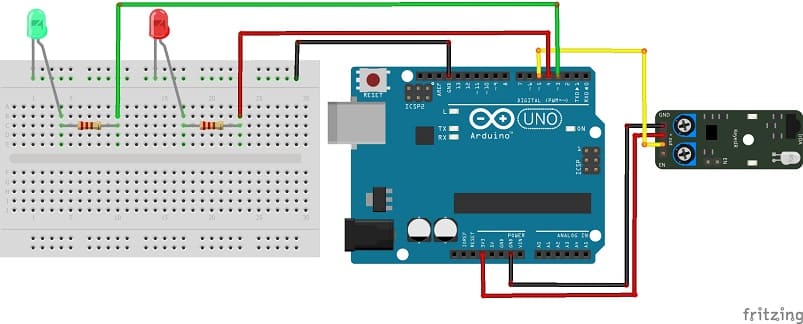
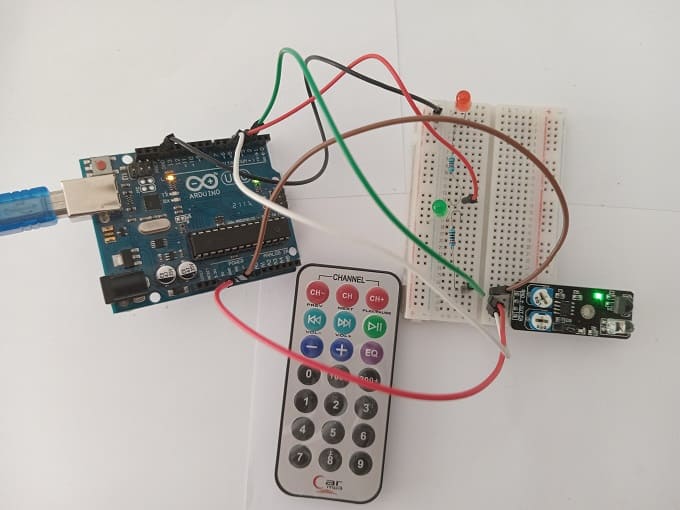
Arduino programming of the Arduino UNO board to receive data from the KY-032 infrared sensor and light up three LEDs
To program the Arduino UNO board to receive data from the KY-032 infrared sensor and light up three LED, use the following code as a starting point for your Arduino sketch:
|
1 2 3 4 5 6 7 8 9 10 11 12 13 14 15 16 17 18 19 20 21 22 23 24 25 26 27 28 29 30 31 32 33 34 35 36 37 38 39 40 41 42 |
#include <IRremote.h> int IR_RECEIVE_PIN = 5; // Use the same pin that you connected to the OUT pin of the KY-032 sensor int LED_PIN_red = 4; // Use the same pin that you connected to the red LED int LED_PIN_green = 3; // Use the same pin that you connected to the green LED int LED_PIN_yellow = 3; // Use the same pin that you connected to the yellow LED IRrecv irrecv(IR_RECEIVE_PIN); decode_results results; void setup() { Serial.begin(9600); pinMode(LED_PIN_red, OUTPUT); pinMode(LED_PIN_green, OUTPUT); pinMode(LED_PIN_yellow, OUTPUT); irrecv.enableIRIn(); // Enable infrared reception } void loop() { if (irrecv.decode(&results)) { unsigned long value = results.value; Serial.println(value, HEX); // Print the received infrared code in hexadecimal format irrecv.resume(); // Prepare the sensor to receive the next infrared signal // Example: Turn on the LED when a specific infrared code is received if (value == 0xFF30CF) // press button 1 on your remote control { digitalWrite(LED_PIN_red, HIGH); // Turn on the red LED digitalWrite(LED_PIN_green, HIGH); // Turn on the green LED digitalWrite(LED_PIN_yellow, HIGH); // Turn on the yellow LED } if (value == 0xFF18E7) // press button 2 on your remote control { digitalWrite(LED_PIN_red, LOW); // Turn off the red LED digitalWrite(LED_PIN_green, LOW); // Turn off the green LED digitalWrite(LED_PIN_yellow, LOW); // Turn off the yellow LED } } } |
Upload the sketch to your Arduino UNO board.
Now, when the KY-032 infrared sensor detects an infrared signal, the received code will be printed in the Serial Monitor of the Arduino IDE. You can modify the code to perform different actions based on the received infrared codes. In the provided example,
- the red LED connected to pin 4 , the green LED connected to pin 3 and the yellow LED connected to pin 2 will be turned on when the specific infrared code (0xFF30CF) is received
- the red LED , the green LED and the yellow LED will be turned off when the specific infrared code (0xFF18E7) is received

